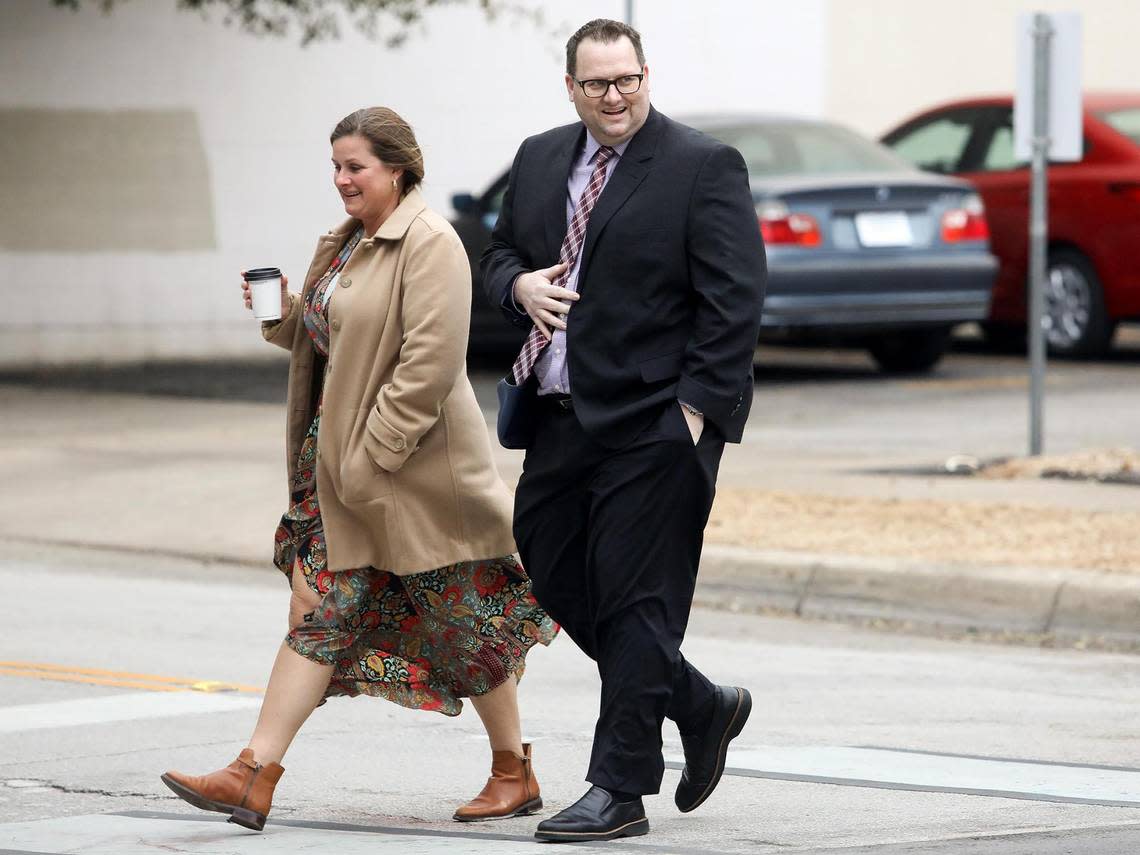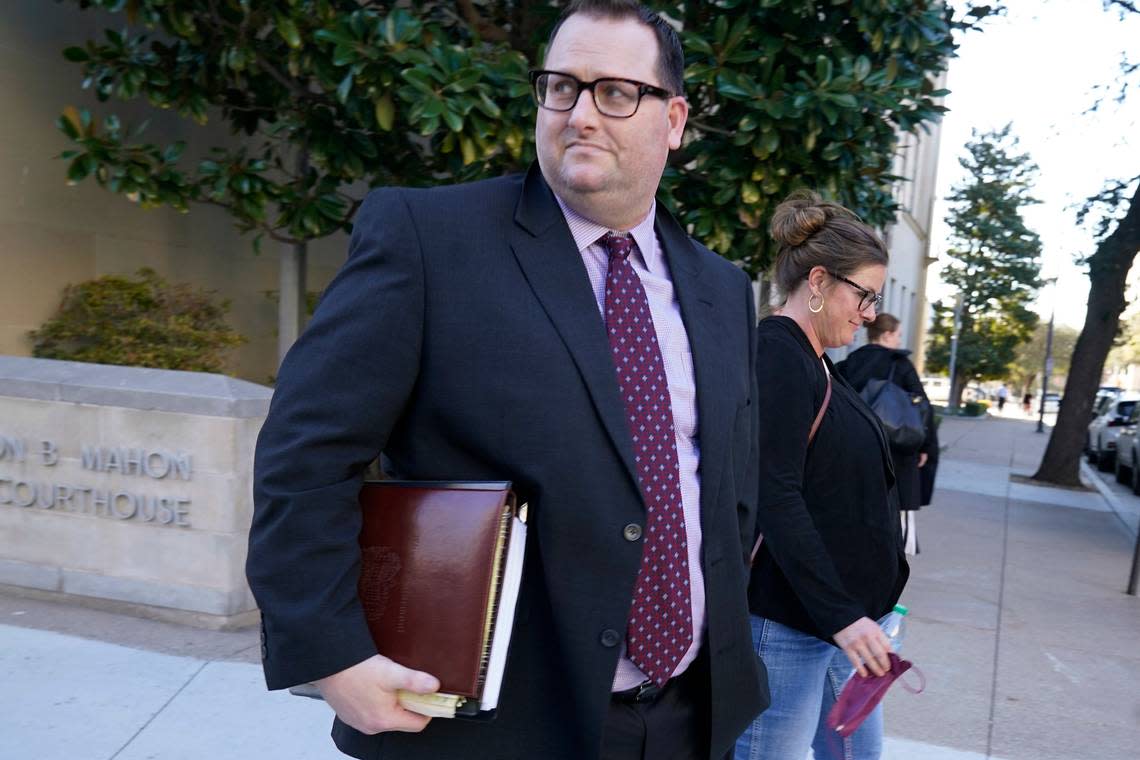Ex-Angels staffer sentenced in pitcher Tyler Skaggs’ Southlake fentanyl overdose death
In a Tarrant County Medical Examiner’s Office room converted hurriedly to a family viewing chamber, Carli Skaggs touched the body of the man whom she had married seven months earlier.
On a gurney, Tyler Skaggs lay dead of a fentanyl overdose. The Los Angeles Angels pitcher had been discovered in a Southlake hotel room.
She kissed his cold lips.
On Tuesday, a U.S. district judge in Fort Worth sentenced Eric Kay, a former Angels employee who handled press inquiries, to 22 years in prison after a jury in February found that he provided to Skaggs the fentanyl-laced pill that led him to aspirate the contents of his stomach and die during a road trip to Texas in 2019.
Skaggs died with his legs hanging off a bed at a Hilton hotel where he and 66 other Los Angeles Angels players and employees stayed the night before a series with the Rangers. He was 27.

Senior U.S. District Judge Terry Means told Kay that he had been dreading sentencing because he considered the 20-year mandatory minimum term in the case excessive.
Still, Means told Kay that he added two years to the minimum term because of the defendant’s statements in recorded jail telephone calls to relatives and friends in which he appeared to blame his lot on prosecutors and Skaggs rather than himself. Kay held a “seeming lack of remorse,” Means said that he had concluded.
The U.S. Attorney’s Office requested a sentence at the upper end of the guideline range that stretched to about 24 years. After Means denied Kay’s motion for a downward variance, his attorney, Cody Cofer, requested a sentence of no more than the 20-year minimum.
At the sentencing hearing, prosecutors referred to an email that Kay sent from jail in which he wrote the jurors were, “fat, sloppy, toothless and unemployed.”
The jury on Feb. 17 found Kay guilty of conspiracy to possess with intent to distribute a controlled substance and distribution of a controlled substance resulting in death and serious bodily injury.
In a recording of a call to his mother played at the hearing, Kay said of Skaggs, “I hope people realize what a piece of (expletive) he is. ... Well, he’s dead, so (expletive) ‘em. That’s how I feel about him.”

Kay called the Skaggs family “dumb” and “white trash” and suggested that Kay’s mother plant negative stories about them in the press, according to phone calls and emails that prosecutors introduced as evidence.
“All they see are dollar signs,” Kay said of the Skaggs family. “They may get more money with him dead than he was playing because he sucked.”
Cofer began to represent Kay after the verdict at trial, during which Kay was represented by Reagan Wynn, whom the State Bar later suspended for six months in connection with an unrelated matter, and Michael Molfetta, whom court records indicate was involved in a disagreement with Kay and his relatives.
Cofer noted that Kay has no criminal history and that he would be 68 years old at the end of a 20-year sentence and not likely to re-offend.
For Kay, the Angels press position had been a dream job for a man who had grown up wanting to take a professional ballfield and was confronted with an environment in which he was expected to “keep the stars happy.”
“If he could be out there playing he would,” Cofer said.
Kay addressed the court in tears. He apologized to his family and for Skaggs used a description that was a departure from the jail calls.
“Tyler Skaggs was a sweetheart of a man. He was so kind to me,” Kay said.
Cofer suggested at the sentencing hearing that, before trial, the U.S. Attorney’s Office and Kay’s former attorneys had explored a plea agreement that would have called for a sentence of between five and 10 years in prison. Kay rejected the plea offer.

U.S. Attorney Chad Meacham of the Northern District of Texas wrote in a statement that his office is “committed to holding to account anyone who deals in illicit opioids, whether they operate in back alleyways or world class stadiums.
“Mr. Skaggs did not deserve to die this way,” Meacham said. “No one does. We hope this sentence will bring some comfort to his grieving family.”
Prosecutors used at trial text messages, telephone records, hotel electronic key entry logs, maps and photographs of the hotel room to explain their case.
In his closing argument, Molfetta said that prosecutors had asked jurors to make assumptions about Kay’s involvement in Skaggs’ death and that federal law enforcement authorities pursued Kay because they wanted to take action on a fentanyl case in which a professional athlete died.
There was no compelling evidence that Kay gave Skaggs the pill that killed him, and the cause of Skaggs’ death was not certain, Molfetta argued.
“This case was reverse-engineered,” he said. Prosecutors, Molfetta said, determined that “Eric Kay is the guy, and we’re going to get him.”

In her summation argument, Assistant U.S. Attorney Lindsey Beran, who left the office after the Kay trial, reminded jurors of testimony from Skaggs’ Angels teammates who said they had received oxycodone pills from Kay, and of a text message that Skaggs sent to Kay on June 30, 2019.
“469. Come up,” Skaggs wrote, referring to his hotel room number.
Four current or former Major League Baseball players testified that they received illicit oxycodone pills from Kay.
Pitcher Matt Harvey said that on June 30, 2019, the day before Skaggs died, he learned at the ballpark that he would not be flying that night with his Angels teammates to Texas from Anaheim for series with the Rangers and Astros.
Disappointed with the travel decision, Harvey avoided other players, whose spirits were higher.
Harvey said that Kay, the director of the Angels communications department, left an oxycodone pill at his locker.
Harvey testified that his displeasure about not making the Texas trip later cooled, and he decided not to take the pill.
The next day he learned that Skaggs was dead.
“I threw the pill away,” Harvey testified.
Harvey testified that he and Skaggs previously ingested oxycodone at Angel Stadium and that, separately, Harvey has used cocaine.
After Skaggs died, Harvey took a flight to Texas and spoke briefly with Kay, who told him they should stay “together during this time,” Harvey testified.
The U.S. Attorney’s Office offered Harvey immunity from prosecution in exchange for his truthful testimony.
Colorado Rockies first baseman C.J. Cron testified that he received small blue pills from Kay on perhaps eight occasions.
Former Angels pitchers Cam Bedrosian and Michael Morin also testified that they received pills from Kay.
Kay did not testify at trial.
After Skaggs’ body was found, Angels employees and players gathered in a ballroom, and Southlake police officers asked them to describe what they knew.
Molfetta acknowledged to the jury that Kay lied when he told police that he had not seen Skaggs after they arrived at the hotel.
About two weeks after Skaggs’ death, Kay shared with another press department employee an account of the hours before his body was found by an Angels security guard. Kay had been traveling with the team.
“He said he had something he needed to tell me,” Adam Chodzko testified.
On a car ride, Kay said that Skaggs had sent a text message to invite Kay to come to his room at the Hilton hotel in Southlake. Kay first declined, then went, he told Chodzko.
Skaggs had three lines of opiates on a hotel menu, Kay told Chodzko.
“He said he watched Tyler do the three lines,” Chodzko testified.
A forensic pathologist who performed an autopsy in the case testified that Skaggs’ death was caused by a mixture of three substances that led Skaggs to aspirate, but stopped short of concluding definitively that Skaggs would have survived had he not ingested fentanyl.
Had Skaggs consumed only alcohol and oxycodone, the other elements of his mixed intoxication, there was “reduced probability” that he would have died, but it “can’t be eliminated,” Dr. Marc Krouse testified.
The cause of death assessment came from Krouse, but the physician noted that the conclusion was reviewed by a critical case review panel of other forensic pathologists in the office that, Krouse testified, agreed with the autopsy report’s finding.
Skaggs’ family released a statement after the sentencing hearing.
“We are very grateful to everyone who worked so hard to investigate and prosecute Eric Kay. Today’s sentencing isn’t about the number of years the defendant received. The real issue in this case is holding accountable the people who are distributing the deadly drug fentanyl. It is killing tens of thousands of people every year in our country and destroying families along with it. We will continue the fight to hold responsible those who allowed Kay to provide a deadly drug to Tyler. But for their actions, Tyler would still be with us today.”
This is a developing story. For the latest updates, sign up for breaking news alerts.
